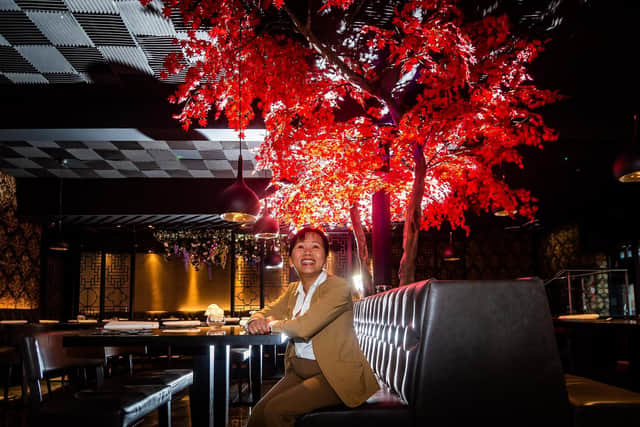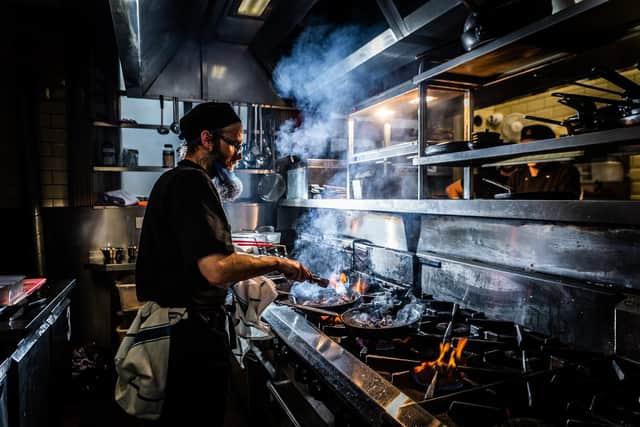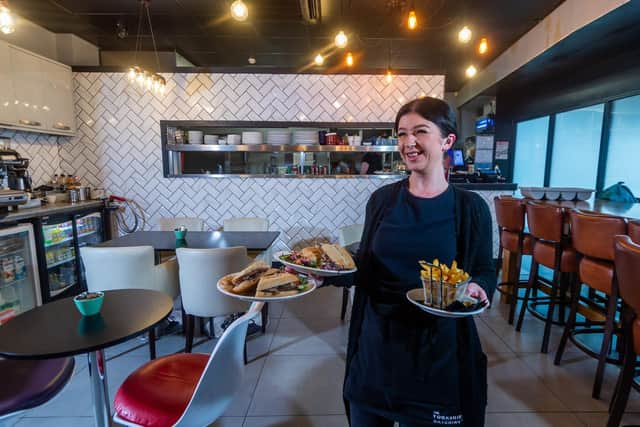Merrie to moreish: How Wakefield is making a name for itself as a foodie city
Chris Hale makes a bold claim. “You can basically eat from anywhere in the world in Wakefield now,” says the local chef.
He’s not wrong. It’s Saturday evening in the city centre and I’m spoilt for choice. I’m standing in the Bull Ring, which later this month will be at the heart of the city’s famed rhubarb festival, and the surrounding streets are lined with cafes and restaurants. They’re largely independents and many of them didn’t exist less than a decade ago.
Advertisement
Hide AdAdvertisement
Hide AdI opt for Turkish cuisine that night, but Thai, Japanese, Greek, Cuban, Abyssnian, Indian, Spanish, Italian, they’re all at my fingertips.


There’s a steady buzz about the place and I’m relieved that many of my home city’s eateries are filled with life after the knock that hospitality has suffered throughout the pandemic.
I’m not the only one to have noticed. “I think people are starting to think let’s get out there and make up for the past couple of years,” says Susan Ralph, executive assistant at Wakefield BID. “And that means putting some money back into the local hospitality economy.”
Susan has only been with the BID – which champions the city centre and its businesses – since April last year. Yet, she’s well versed on how the area is changing. “When units become vacant, a lot are being taken up by restaurants or cafes and coffee bars,” she says.
Advertisement
Hide AdAdvertisement
Hide AdUnit space has not been in short supply, with the changing face of Britain’s high streets. A Turkish grill, for example, sits in the building that only six years ago housed Wakefield’s post office.


“Recently there has been this growth of cafe culture and I think that’s been a kind of saving grace for dying high streets,” says Leeds Beckett University academic Dr Rachel Rich, the editor of the Food & History journal. “Even if people aren’t shopping so much face to face any more, people still want to convene in high streets and you can make profit from getting them there to eat and drink.”
It’s quite an accessible industry, Chris Hale tells me. Formerly the owner of an altitude training company, he transitioned into the food business after appearing on MasterChef in 2016 and now runs Yorkshire Event Catering, a firm focusing on pop-up restaurants, fine dining and catering for functions.
“People are passionate about food, and I think people see it as quite an easy industry to get into,” he says. “People do go into it without a great deal of specialist knowledge. And if you do things right, it doesn’t need to be cost-prohibitive.”


Advertisement
Hide AdAdvertisement
Hide AdMoney, I’m told, is one reason why Wakefield has proved to be an attractive prospect for restaurateurs. The cost of renting a property, and of paying rates, makes it a much more affordable option than neighbouring Leeds.
The clientele is there too; as well as those that live in the city and the wider district, two central train stations means Wakefield is easy to get to from across much of Yorkshire, and further afield.
“Wakefield is developing and there’s a big community of people here,” says Linh Hoai Le Thi, director of Tet restaurant, which opened its doors in 2017. “I think restaurants chose to open here because there wasn’t as much good quality choice. That meant people were going out of the city, to Leeds or elsewhere.”
Now, things are starting to shift. A quarter of businesses in the city centre are food and drink related and at least 13 new independent hospitality establishments have opened their doors since March 2020, even with the challenges that the Covid pandemic has presented. “Now there’s a lot of choice locally,” adds Linh. “We have more quality restaurants now.”
Advertisement
Hide AdAdvertisement
Hide AdWakefield food blogger Alex Whur agrees. She launched her foodie Instagram page close to three years ago, as more eateries opened up in the city that she wanted to try. “You can go into Wakefield now and get your night out there and get everything that you went to Leeds for previously,” she says, “and cheaper.”
There’s a definite sense of a food renaissance in the city, and with chain franchises few and far between, independents are at the heart. Their individual menus, decor and atmospheres contribute to experiences that are unique to Wakefield – and that’s an attractive prospect for diners.
For Jenny Thompson, who owns the Qubana, Fino and Robatary restaurants in the city centre, the focus is very much on creating “destination venues”. “I think that’s what Wakefield is starting to do quite well,” she says, “creating establishments where it’s more than just going out for some food – it’s somewhere that you can go and spend the entire evening.”
Farm shops also have a role to play. Both Farmer Copleys and Blacker Hall Farm, for instance, offer the opportunity to purchase fresh, locally-grown produce – and to eat it in their respective restaurants.
Advertisement
Hide AdAdvertisement
Hide Ad“People in Wakefield want to eat out and they want to eat well,” says Tanya Goldthorpe, head of marketing at the latter. “They want to go out for lunch to nice local restaurants, pubs and cafes and I think some of that comes down to the fact a lot of the produce that they’re getting in those places is farmed on local fields and locally grown.”
So proud is the local area of its continuing links with cultivating two particular products – rhubarb and liquorice – that there are annual festivals dedicated to celebrating them.
From the 19th century, Wakefield began to grow rhubarb, supplying markets in London and onto Europe and becoming known as one third of the rhubarb triangle of Yorkshire’s West Riding. Today, local farmers still grow the crop.
Liquorice garths, meanwhile, sprung up all over nearby Pontefract, from the 1700s and by 1900, Pontefract liquorice travelled the world. In the last decade, the crop started to be grown in the district again.
Advertisement
Hide AdAdvertisement
Hide Ad“We’re really proud of how rhubarb and liquorice are a key part of the district’s food and drink offer,” says Coun Michael Graham, Wakefield Council’s cabinet member for culture, leisure and sport, “and that our festivals continue to celebrate and breathe life into our history.”
This year, when the Rhubarb Festival returns from February 25-27, a new rhubarb food and drink trail will allow visitors to sample drinks and dishes across more than 30 hospitality venues.
It’s one of the ways in which organisers hope the event will celebrate Wakefield’s culinary heritage whilst supporting its food and drink sector today.
There are high hopes now that the sector will continue to grow. Already the clustering of venues around Wood Street, Northgate, Cross Street and the Bull Ring has effectively led to the development of a central food and drink area – and there’s excitement about what could happen next.
Advertisement
Hide AdAdvertisement
Hide AdThere’s scope, Chris says, to tap into a high-end fine dining market, particularly with the redevelopment of Wakefield’s waterfront. Other business owners tell me there’s potential for a Wakefield version of Leeds’ vibrant bar and restaurant-filled Greek Street, a hub for food and drink.
Christian Lawlor, who runs the Yorkshire Deli and Pizza Bar, is among them. “Restaurants breed restaurants,” he says. “People are scared of competition but you should embrace it. The more people we can get in the area, the better it is for everyone.”
In other words, the more cafes and restaurants that open, the more reason for people to eat in the city. And Wakefield appears to have cracked that.
“People don’t need to go to Leeds now, they can stay local and support local businesses,” Linh says. “People are able to enjoy so much variety without having to go very far.”
Advertisement
Hide AdAdvertisement
Hide AdThe footfall that Saturday evening during my city centre visit tells me people are starting to do just that. The word, it seems, is spreading and with it, Wakefield’s reputation for food is growing.
Support The Yorkshire Post and become a subscriber today. Your subscription will help us to continue to bring quality news to the people of Yorkshire. In return, you'll see fewer ads on site, get free access to our app and receive exclusive members-only offers. Click here to subscribe.
